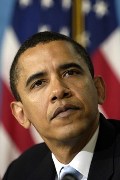The Obama “Hope” Poster Case — What’s a “Visual Reference”?

 (This is the sixth in a series of posts on Fairey v. Associated Press. See below for other posts in the series.)
(This is the sixth in a series of posts on Fairey v. Associated Press. See below for other posts in the series.)
This is a (second) unplanned additional post in my series on the copyright and litigation issues raised by the Obama “Hope” poster case. One of the key fights in the case is going to be over what, exactly, the relationship between the two images above is. Is it the use of a photograph for a transformative purpose, or is it merely plagiarism for commercial benefit?
One hint at how Fairey’s lawyers are going to argue this question is in the complaint‘s use of the phrase “used as a visual reference.” (Compl. ¶¶ 18, 34.) In a previous post, I expressed puzzlement at that phrase, which appeared to me to be just a way of obfuscating the creation process behind the poster. The AP’s lawyers may have been puzzled too, because they did not refer to the term at all in their lengthy counterclaims; instead, they simply referred to Fairey’s “copying.” (Answer ¶ 129.) But I’ve since come across an indication that “reference” may be a technical term in the art world, one that appears to mean the target of an intended visual allusion.
Assuming that’s what it means, I’ve got three quick comments on the use of the term “reference” in the complaint.

